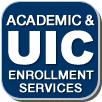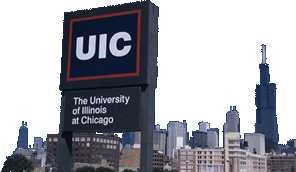Learning Sciences
Important Note: This is the archived version of the 2012–2014 Graduate Catalog. The information on these pages was archived on August 22, 2012 and will not be updated as requirement and/or program changes are approved.
Admission Requirements Degree RequirementsMailing Address:
1007 West Harrison Street (MC 057)
Chicago, IL 60607-7137
Campus Location: 2048 Behavioral Sciences Building
Program Code: 20FS5084PHD
Telephone: (312) 413-3901
E-mail: deana@uic.edu
Web Site: http://grad.lsri.uic.edu/
Graduate Program Head/Chair: Susan Goldman
Director of Graduate Studies: Donal Wink
The UIC Graduate College offers an interdisciplinary program of academic work leading to the Doctor of Philosophy in Learning Sciences. This doctoral degree complements and draws on expertise in learning sciences research conducted in several academic departments and degree programs on the campus, including those in Chemistry, Computer Science, Education, Mathematics, Psychology, and others. Consult the appropriate chapters in this catalog for information on degree programs in these related disciplines.
Admission Requirements
Applicants are considered on an individual basis. Transcripts of all undergraduate and any graduate work must be submitted. In addition to the Graduate College minimum requirements, applicants must meet the following program requirements:
Doctor of Philosophy
- Baccalaureate Field No restrictions.
- Master's Degree Optional.
- Grade Point Average At least 3.25/4.00 (or 4.25/5.00) for the final 60 semester (90 quarter) hours of baccalaureate study and for all postbaccalaureate course work.
- Tests Required GRE.
- Minimum English Competency Test Score
- TOEFL 550 (paper-based); 80, with subscores of Reading 19, Listening 17, Speaking 20, and Writing 21 (iBT Internet-based), OR,
- IELTS 6.5, with subscores of 6.0 for all four subscores.
- Letters of Recommendation Three required; attesting to potential for success in rigorous doctoral program in Learning Sciences.
- Personal Statement Required. Statement must identify and explain applicant's career objectives and qualifications for pursuing a doctoral degree in Learning Sciences. Statement must also specify an area of specialization (i.e., a field or discipline in which the applicant intends to pursue the study of learning), and an explanation of the applicant's experience and background in that area. Personal statement must be 3 to 5 pages in length, typed, double-spaced.
- Deadlines The fellowship/priority application deadline is January 1. March 15 is the preferred application deadline and the extended application deadline is May 15. Admission is restricted to the fall term.
Degree Requirements
In addition to the Graduate College minimum requirements, students must meet the following program requirements:
Doctor of Philosophy
-
Minimum Semester Hours Required 96. For applicants holding a master's degree, the admissions process includes an evaluation of the applicant's record, desired specialization, and a decision regarding any modifications to the Learning Sciences program requirements.
-
Course Work Required Core Courses: LRSC 500, 501, 503, 511, 512, 513, 540, 590, and 599.
-
Required area of disciplinary specialization: Students take advantage of courses offered through existing doctoral programs at UIC, for example in Chemistry; Cognitive Psychology; Computer Sciences; Mathematics or Mathematics Education; Literacy, Language, and Culture; or Urban Educational Leadership). The specialization is selected in consultation with the student’s Learning Sciences academic advisor and an advisor in the disciplinary specialization. A minimum of 12 hours of specialization course work is required.
-
Electives: A minimum of 16 hours of electives to enroll in additional graduate courses in the disciplinary specialization, research methods, other disciplines, or special topics courses offered periodically in the Learning Sciences program. These courses will be selected in consultation with the student’s advisor in the Learning Sciences program and in consultation with the course instructor to determine relevance and appropriateness of course content to the student’s program goals and academic preparation for the course.
-
Supervised Research: A required supervised research component of 30 hours, to include research-apprenticeship experiences as well as thesis research.
-
Examinations Students will be required to submit an annual review,* following a template provided by the Learning Sciences program, to show evidence of academic and professional progress. Required courses specify examination requirements.
- Comprehensive Qualifying Examination: Required portfolio examination. From each core course, students generate at least one product or document that contributes to the portfolio. The student may also include such products from specialization and elective courses. In addition, evidence of research and inquiry activity is to be included in the portfolio. Upon completion of the core courses or the required portfolio items the student will orally defend the contents of the portfolio before a committee of LS faculty who will determine passing or failing of the comprehensive exam.
- Preliminary Examination: Required. The preliminary exam is an oral defense of the completed dissertation proposal and is taken after successful completion of the comprehensive qualifying exam. The primary purpose of the preliminary examination is review and approval of the thesis research proposal and admission of the student to the dissertation research stage of degree candidacy.
- Thesis Research Required. The completed thesis research must be defended orally and publicly before a thesis committee.
*Annual Review Required: While it is not, strictly considered, an examination, an annual student assessment will constitute the first step in a two-step student assessment process, of which the comprehensive written exam is the second part. In the first part, each student will submit an annual review to the doctoral advisor, consisting of a record of progress through the program, relevant professional experiences, and, importantly, candidate self-assessment of academic and professional progress. Failure to submit an annual review upon repeat notification to students will constitute evidence of insufficient progress through the program, leading to consideration of dismissal from the program. Due process will be observed to protect student rights and program integrity.




